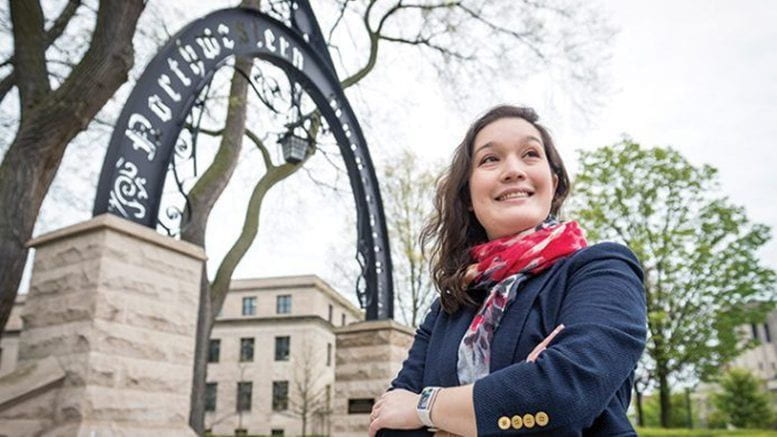After two months of tightly guarding news that she had earned a research-propelling grant, Julia Kalow’s secret is out.
On August 4, the U.S. Department of Energy (DOE) announced Kalow as one of its 2023 Early Career Research Program award winners.
Kalow, a Weinberg College of Arts and Sciences faculty member since 2016, was one of 93 scientists representing 47 universities and a dozen DOE National Laboratories across the country to capture the prized federal award, an honor designed to support the next generation of America’s STEM leaders and solidify the nation’s premier global standing as a driver of science and innovation.
“It’s exciting but also a relief because of how competitive it is these days to get the funding essential to scientific discovery,” says Kalow, who was recently promoted to associate professor in the Department of Chemistry.
Persistence leads to promising potential
After falling short of earning the Early Career award during the 2022 funding cycle, Kalow took the DOE selection committee’s direct feedback to heart and revamped her proposal for 2023. She incorporated an added year of scientific data and refocused her project and its scientific content, producing a lively argument for the necessity and relevance of her work. The earnest effort delivered the hoped-for result when the DOE’s Office of Basic Energy Sciences selected Kalow’s project for funding and awarded her a five-year, $875,000 grant following a review by outside scientific experts.
“This was my last shot to apply for the Early Career award, so it’s meaningful to receive the honor and have the DOE recognize the importance of our research and show confidence in our lab,” says Kalow, a former Sloan Research Fellow and National Science Foundation CAREER honoree.
Kalow’s project – “Selective Photochemical Reactions for the Discovery of Triplet Photosensitizers” – will empower her lab’s work to discover new photosensitizers using selective photochemical reactions. The efforts have the tantalizing potential to spur the development of new materials with advanced performance and minimal environmental impact.
“The basic idea is that we want to discover molecules that can absorb light and then do something useful with that light, whether that’s producing energy or breaking down or making new chemicals,” Kalow says.
Ditching convention
To this end, Kalow’s science adopts an unusual approach. Rather than the prevailing one-at-a-time approach to synthesis and testing, which creates bottlenecks for experimental validation and discovery, Kalow draws inspiration from Charles Darwin’s “survival of the fittest” evolutionary concept.
Kalow plans to bypass design by directly identifying photosensitizer candidates from libraries of molecules on the basis of their light-induced reactivity. Selective photochemical reactions that “tag” triplet photosensitizers – light-harvesting molecules with long-lived excited states – will be combined with high-throughput techniques to isolate and analyze the resulting products.
“Only the molecules with the best properties will shine through in experimentation,” says Kalow, adding that the DOE funding enables her to purchase vast compound libraries from commercial vendors to fuel experimentation.
While the work can inform new design rules for molecules, one of the most compelling potential applications resides in using light as an available energy source to deconstruct polymer plastic waste.
“It’s a different way of thinking about discovery and molecules as well as work that can help address the world’s plastic waste crisis,” Kalow says. “We already have a nice proof of concept, and it’s exciting that we can expand what we’re doing to a broader range of molecules with the support of this award.”

